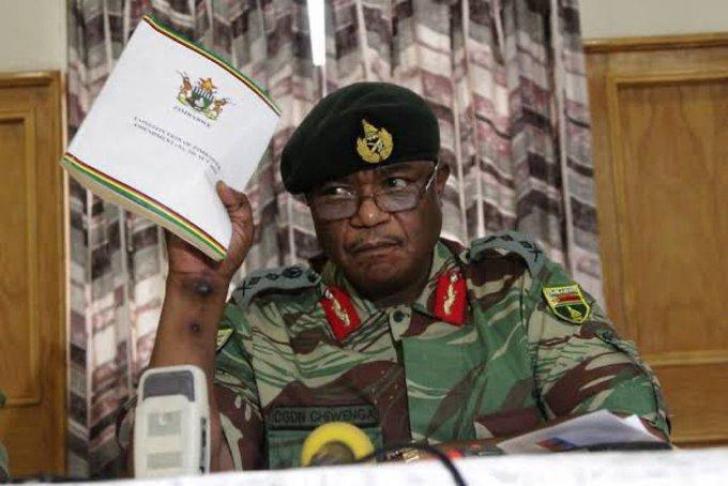News / National
Mnangagwa in strategic retreat as Chiwenga faction blocks 2030
27 Oct 2024 at 12:57hrs |
0 Views

President Emmerson Mnangagwa is reportedly under intense pressure from Vice President Constantino Chiwenga and his military-backed faction within Zanu PF to abandon his aspirations for a third term and the controversial 2030 political campaign.
According to The NewsHawks, the military, a powerful broker in Zanu PF and Zimbabwean politics, is poised to intervene if Mnangagwa pushes his agenda too aggressively. Mnangagwa originally rose to power following a November 2017 coup led by Chiwenga, and there was an understood agreement that he would serve one term until 2023 before handing over power to Chiwenga.
The late Foreign Affairs Minister Sibusiso Busi Moyo had alluded to this arrangement in discussions with The NewsHawks before his death in January 2021, stating that Mnangagwa's ascension was supposed to pave the way for Chiwenga's leadership. However, after winning a disputed election in 2018, Mnangagwa shifted his strategy and launched the "ED 2023" campaign, effectively reneging on the agreement with Chiwenga.
This move saw Mnangagwa campaign without the military's usual logistical support during the 2023 general elections, opting instead for a Central Intelligence Organisation (CIO)-driven approach. The CIO, under the leadership of retired Brigadier-General Walter Tapfumaneyi, took control of the electoral process through a structure known as Forever Associates Zimbabwe (Faz), circumventing the military's traditional role in overseeing elections.
Following his electoral victory, Mnangagwa expressed intentions to pursue a third term, prompting Chiwenga to rally his military allies and resist the 2030 campaign. Notably, Chiwenga refrained from endorsing the "ED 2030" slogan during the recent Zanu PF conference in Bulawayo, indicating a growing rift between the two factions.
In a bid to consolidate power, Mnangagwa appointed Zimbabwe Defence Forces commander General Phillip Valerio Sibanda to the Zanu PF politburo during the party's annual conference last year, aiming to neutralize potential threats from the military. However, this controversial move faced significant backlash, further isolating Mnangagwa from Chiwenga's faction.
The ongoing power struggle reached a critical juncture at the Bulawayo conference, characterized by political brinkmanship reminiscent of the earlier conflicts between Mnangagwa and former President Robert Mugabe. While Chiwenga's faction believes they have effectively halted Mnangagwa's plans, the Mnangagwa camp describes the situation as a "strategic retreat."
Despite this retreat, sources indicate that Mnangagwa still holds a resolution supporting the 2030 agenda, though military support remains elusive. The ongoing psychological operations against Mnangagwa, including the presidential helicopter crash in Masvingo and the 2018 White City Stadium grenade attack, have instilled fear within his faction, prompting a cautious approach moving forward.
As tensions simmer, both factions remain poised for a showdown, with the outcome dependent on internal negotiations and the military's ultimate stance on the direction of Zimbabwe's political future.
According to The NewsHawks, the military, a powerful broker in Zanu PF and Zimbabwean politics, is poised to intervene if Mnangagwa pushes his agenda too aggressively. Mnangagwa originally rose to power following a November 2017 coup led by Chiwenga, and there was an understood agreement that he would serve one term until 2023 before handing over power to Chiwenga.
The late Foreign Affairs Minister Sibusiso Busi Moyo had alluded to this arrangement in discussions with The NewsHawks before his death in January 2021, stating that Mnangagwa's ascension was supposed to pave the way for Chiwenga's leadership. However, after winning a disputed election in 2018, Mnangagwa shifted his strategy and launched the "ED 2023" campaign, effectively reneging on the agreement with Chiwenga.
This move saw Mnangagwa campaign without the military's usual logistical support during the 2023 general elections, opting instead for a Central Intelligence Organisation (CIO)-driven approach. The CIO, under the leadership of retired Brigadier-General Walter Tapfumaneyi, took control of the electoral process through a structure known as Forever Associates Zimbabwe (Faz), circumventing the military's traditional role in overseeing elections.
In a bid to consolidate power, Mnangagwa appointed Zimbabwe Defence Forces commander General Phillip Valerio Sibanda to the Zanu PF politburo during the party's annual conference last year, aiming to neutralize potential threats from the military. However, this controversial move faced significant backlash, further isolating Mnangagwa from Chiwenga's faction.
The ongoing power struggle reached a critical juncture at the Bulawayo conference, characterized by political brinkmanship reminiscent of the earlier conflicts between Mnangagwa and former President Robert Mugabe. While Chiwenga's faction believes they have effectively halted Mnangagwa's plans, the Mnangagwa camp describes the situation as a "strategic retreat."
Despite this retreat, sources indicate that Mnangagwa still holds a resolution supporting the 2030 agenda, though military support remains elusive. The ongoing psychological operations against Mnangagwa, including the presidential helicopter crash in Masvingo and the 2018 White City Stadium grenade attack, have instilled fear within his faction, prompting a cautious approach moving forward.
As tensions simmer, both factions remain poised for a showdown, with the outcome dependent on internal negotiations and the military's ultimate stance on the direction of Zimbabwe's political future.
Source - online
Join the discussion
Loading comments…









































